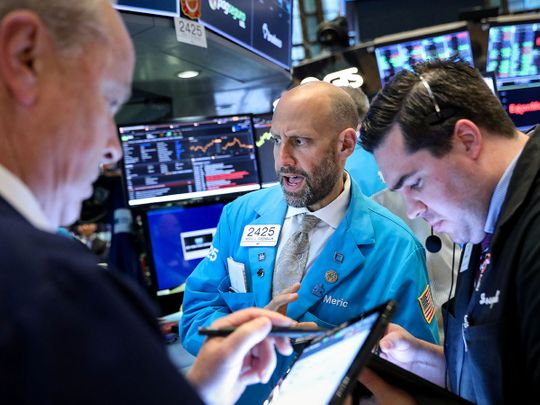
Dubai: As an aggressive market rally slows, more profit-taking was seen on the horizon as investors cash in some gains they made on stocks the past few months of the pandemic and as oil prices begin to factor in the weakness.
US stock markets persistently fell sharply towards the end of last week, but on Friday pared some of those losses, as trading turned volatile after investor sentiment turned soured on the high-flying tech companies.
See more
- Pictures: Brazil's newest and largest bank note
- First residents have moved into Deira’s landmark development
- From Sharjah Corniche to Al Majaz Water Front check out Sharjah neighbourhoods where rents have fallen
- Gulf Related opens SAR-1 billion Antara residential development in Diriyah in Riyadh
- Jumeirah Living Marina Gate serviced residence opens in Dubai Marina
- All the cool, fun activities you’ve missed in the UAE in the last 6 months
Profit-taking begins?
The S&P 500, commonly perceived as a global benchmark, fell 3 per cent at its low point on Friday but ended down 0.8 per cent and the Dow Jones, which had fallen 850 points, ended down 0.56 per cent. The tech-heavy Nasdaq retreated 1.27 per cent after regaining morning losses of 5 per cent. All three indexes had dropped significantly on Thursday, their biggest one-day declines since June.
In Europe stock markets also closed down. In London the FTSE dropped 0.88 per cent, Germany’s DAX dropped 1.65 per cent and in France the CAC dropped 0.89 per cent. Asian markets had also closed down after Wall Street’s fall.
Tech-driven rally stumbles
The falls in the US were led by the technology sector, whose share prices have soared during the coronavirus pandemic as investors have bet more business will move permanently online. However, with investors now looking to make some profits, this indicates what analysts had previously warned as an overinflated rally.
Shares of Apple fell 7 per cent, while Facebook and Amazon slid more than 6 per cent. Google parent Alphabet and Microsoft both fell at least 4 per cent. Zoom, the video conferencing company whose shares were up 400 per cent before the fall, lost another 4 per cent.
Returning market volatility?
Normally, the VIX (VIX) is muted when US stocks are at record highs. But some market analysts grew concerned in recent days because the VIX kept rising - even as the S&P 500 made new highs.
In fact, the VIX hit its highest level ever at an all-time high for the S&P 500, according to an analysis by Goldman Sachs. The previous high was set in March 2000 during the dot-com bubble. Analysts are considering this a red flag, with markets currently at a high-risk of a market crash.
Markets still going up
However, share prices of all the companies remain sharply up for the year and before Thursday, the S&P 500 had been up in nine of the last 10 trading sessions.
Friday’s selloff came as the US, the world’s largest economy, announced employers had added another 1.4 million jobs in August and the unemployment rate fell to 8.4 per cent, the first time it has dipped below 10 per cent since the pandemic hit the US economy.
Macro view, oil prices hurt GCC bourses
Alongside UAE bourses, other stock markets in the Gulf fell on Sunday in response to Friday’s slide in oil prices as fears of a slowing post-pandemic rebound compounded worries of weakening oil demand.
Dubai’s main share index fell 1.05 per cent, dragged down by a 2 per cent fall in blue-chip developer Emaar Properties’ stock and a 0.9 per cent fall in Dubai Islamic Bank shares.
In Abu Dhabi, the index lost 0.49 per cent, hurt by a 0.7 per cent fall in top lender First Abu Dhabi Bank and a 0.4 per cent drop in Emirates Telecommunications.
The Dubai Financial Market (DFM) rose 0.9 per cent last week, largely gaining all through the week. Meanwhile, the Abu Dhabi Securities Exchange (ADX) too rose last week, slightly up 0.3 per cent, gaining for four out of five sessions last week.
Confidence wanes after strong August
Both the Dubai and Abu Dhabi bourses have been tracking sentiments seen in markets worldwide. Trading on the UAE benchmarks have turned much confident the past weeks, just like the global stock markets. However, trading had turned comparatively lull last week, after amassing record gains during the month.
After dropping about 4 per cent in the month of May, the DFM rose 6 per cent in the month of June but slipped 0.5 per cent in July. Similarly, the ADX slipped 2 per cent in May and rose 3.5 per cent in June but slipped 0.2 per cent in July. Amassing bigger gains in August, the DFM gained 9.8 per cent in the current month, whereas the ADX gained 4.9 per cent.
Elsewhere, Saudi Arabia’s benchmark index eased 0.5 per cent, with Saudi Basic Industries Corp (SABIC) falling 2 per cent and Al Rajhi Bank down 0.6 per cent. Weighing on sentiment on Sunday was a drop in oil prices as Benchmark Brent crude oil fell $1.41, or 3.2 per cent, to settle at $42.66 a barrel.








